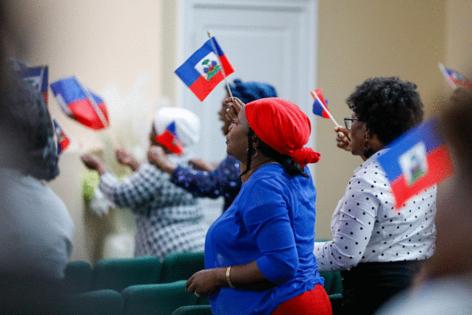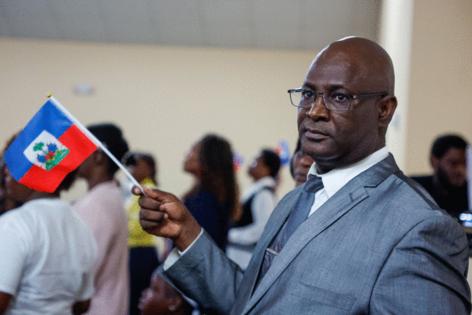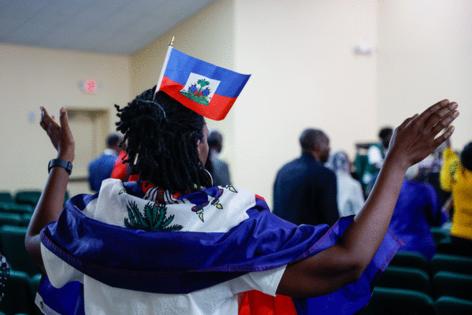Facing danger abroad, Florida's Haitians caught in immigration crossfire
Published in News & Features
TAMPA, Fla. — On a mid-July Sunday afternoon in Tampa, the Rev. Claudet Saintil led prayers in Haitian Creole at New Jerusalem Haitian Baptist Church. They called for an end to mass deportations and a humane solution for immigrants without permanent legal status.
“It’s a difficult situation for everyone,” he said. “So, we pray.”
The fight for legal protection has become an ongoing struggle, particularly for Haitians in Florida, amid an exhausting cycle of changing policies. From temporary protected status, a designation afforded to immigrants who cannot return home safely, to humanitarian programs, each new policy offered limited relief but not a definitive solution. More than 500,000 Haitians live in Florida, according to the U.S. Census Bureau.
Temporary protected status, or TPS, has been extended multiple times since it was approved in 2010 after a magnitude 7 earthquake that January. The legal protection provided work authorization to tens of thousands of Haitians in the U.S. But it was always meant to be temporary.
The Department of Homeland Security announced in June it would terminate this protection as soon as Sept. 2, even though it had previously been extended by the Biden administration through February 2026.
The department said conditions in Haiti have improved enough, enabling 500,000 Haitians to return home “in safety,” though a federal judge in New York has since blocked the Trump administration from ending the status.
Meanwhile, Haiti has been under a government-issued state of emergency since March 2024. The U.S. Department of State has warned Americans not to travel there due to kidnapping incidents, civil unrest, limited health care, and “widespread violent crime and organized crime.”
Armed groups control 80% of the Port-au-Prince metropolitan area and have expanded into rural areas following the 2021 assassination of President Jovenel Moïse. Last year, 5.5 million Haitians required humanitarian assistance, according to the United Nations.
Advocates, academics and members of the Haitian community said Haiti is still far from solving its internal crisis. That should be enough, they said, to stay off the list of countries losing certain immigration benefits.
“I am deeply disturbed by the U.S. government’s decision, while simultaneously there’s a statement warning American citizens that Haiti is still too dangerous,” said Katsia Cadeau, a professor at St. Thomas University and director of Lively Stone Church of Miami, a Haitian congregation near Little Haiti, the largest Haitian community in the state.
Kéto Nord Hodges, a math and special education teacher and prominent member of Tampa Bay’s Haitian community, said conditions in Haiti are the most difficult they’ve been in recent years.
“Children can’t go to school, gangs attack shelters, and hospitals are out of reach for most people because of the situation,” said Hodges, 45. “And now some TPS grantees have been arrested while at court, just for seeking relief or simply updating their paperwork since Trump came to office.”
Another recent immigration program for Cubans, Haitians, Nicaraguans and Venezuelans has already been cut off. It was launched in early 2023 to allow limited legal entry. By 2024, more than 110,000 Cubans, 211,000 Haitians, 93,000 Nicaraguans and 117,000 Venezuelans were granted entry through this program, according to the nonprofit Refugees International.
In April, the U.S. Supreme Court allowed the Trump administration to move forward with revoking these protections, citing national interest and resource constraints.
In response, a group of five Haitians sued the Trump administration over deportation protections. The case was filed July 30 in federal court in the District of Columbia.
Edouard Francois, a pastor at COMOR Baptist Church in Tampa, said one of the families in his Haitian-majority church has been in the United States for 13 years. He said they work hard, pay taxes and send their five kids to school, but still live in fear of being forced to leave.
“Thirteen years. And now you tell them it’s time to go?” said Francois. “Can you imagine?”
The feeling is much the same at New Jerusalem Haitian Baptist Church, where community members sing, pray and hug one another. They come seeking strength and answers to the uncertainty they face.
Some lost family members. Others had their homes taken by gangs. Many more left just to save their lives. Saintil said returning to Haiti is simply not an option for them.
“Many prefer not to speak or share their cases publicly,” he said. “No one feels safe.”
_____
©2025 Tampa Bay Times. Visit tampabay.com. Distributed by Tribune Content Agency, LLC.












Comments